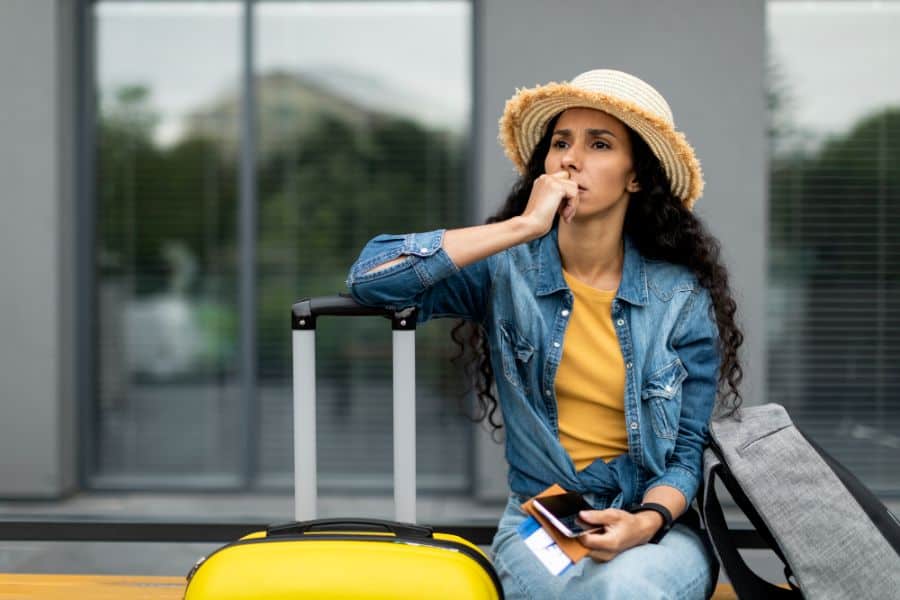- TRAVEL GUIDES
arrow_drop_down
- Canada
- United States
- Sunny Destinations
arrow_drop_down
- VIEW ALL
- BUCKET LIST
- ABOUT
- CONTACT
Top 19 Travel Scams at the Most Popular Tourist Destinations in the USA
- Travel Tips
-
Jun 09
- Share post

1. Fake Hotel Calls
When you’re on vacation, those pesky fake hotel calls can really put a damper on your trip. A scammer pretends to be hotel staff and calls your room in the middle of the night.
They might say there is an issue with your credit card. Their goal? To get you to share your personal or financial information. Never give out your details over the phone. Instead, hang up and call the front desk directly. Always remember to verify with hotel staff in person.
2. Broken Taxi Meter
One common scam to watch out for is the broken taxi meter. You hop into a cab, and the driver says the meter isn’t working. By the end of the ride, you’re hit with an outrageous fare.
This scam often occurs in busy tourist spots. New York City and San Francisco are popular places where this might happen. Be cautious, especially near airports and train stations.
To avoid this scam, use apps like Uber or Lyft. If you must take a taxi, insist on seeing the meter on. If they refuse, get out and find another ride.
3. Overbooked or Closed Hotel
One of the sneakiest scams is when a cab driver claims your hotel is overbooked or closed. They might say there’s a problem and then take you to a different, more expensive hotel.
To avoid this, always confirm your booking directly with the hotel before you travel. If a driver tries this scam, insist on being taken to your original hotel, or call the hotel yourself.
4. Free Bracelets or Rosemary
When visiting popular tourist spots, you might encounter locals offering a “gift” like a bracelet or a sprig of rosemary. They seem friendly and genuine, taking the opportunity to strike up a conversation.
As soon as you accept the bracelet or rosemary, they change their tune and demand payment. If you refuse, they create a loud scene, embarrassing you until you pay up.
To avoid falling victim to this scam, simply decline any unsolicited gifts. Politely but firmly say no, and keep walking. It’s best to stay cautious and trust your instincts when approached by strangers with “free” items.
5. Spills on Your Clothing
A common scam in US tourist destinations involves “spills” on your clothing. This trick usually starts with a bystander “accidentally” spilling something like ketchup or mustard on you.
They immediately rush to help, offering to clean it up. While you’re distracted, their partner swoops in to snatch your wallet or bag.
If someone spills something on you, stay calm and politely decline their help. Head to a restroom or a safe place to clean up. Be cautious and protect your belongings to avoid becoming a victim of this scam.
6. Fake Police Officers
Watch out for fake police officers in busy tourist areas! They might approach you asking for your passport or claiming you broke a law. These scammers dress in realistic uniforms and show fake badges to seem legitimate.
Once they have your attention, they may ask for a bribe to let you go. If you feel uneasy, insist on seeing their ID and avoid handing over money. If in doubt, contact the local embassy or genuine police department to verify the officers’ identity.
7. ATM Skimming
ATM skimming is a popular scam in the USA. Thieves install devices on ATMs to steal your information. These gadgets capture card data when you use the machine. To protect yourself, inspect the ATM before using it. Look for signs of tampering. Also, cover your hand when entering your PIN. Use ATMs in well-lit, busy areas.
8. Street Performance Distractions
You’re walking through a bustling city when you see an amazing street performer. Their act is captivating, and suddenly, you feel a tap on the shoulder. Distraction scams use amazing performances to divert your attention. While you’re watching, an accomplice might be targeting your valuables.
For example, someone could bump into you “accidentally,” while another person lifts your wallet. To avoid this, keep your belongings secure and don’t let your guard down. Watch the show, but be cautious of those around you.
9. Fake Ticket Sellers
Fake ticket sellers are crafty and target busy tourist spots. They lure you with prices that seem like a steal, but you lose your money and travel plans. Always buy tickets from official websites or trusted vendors. Scammers may ask for payment before showing you a confirmation number or e-ticket.
To avoid this, double-check any too-good-to-be-true deals and read reviews of the seller. Stick to reputable sources for peace of mind and enjoy your trip without ticket troubles.
10. Timeshare Presentations
When you’re exploring popular tourist destinations in the USA, you might encounter timeshare presentations. These often seem like a fantastic way to get free or discounted vacations. But once you’re inside, the sales pitch can feel relentless. You’re promised luxurious vacation spots but also face pressure to sign contracts on the spot.
Many timeshares include annual fees and restrictions on usage, making them less appealing long-term. To avoid traps, always read the fine print and don’t rush into any decisions.
11. Credit Card Scams
When traveling, one significant scam to watch for is credit card fraud. One of the worst tricks involves merchants manipulating the decimal point when you make a purchase. Suddenly, a $20 souvenir becomes a $200 or even $2,000 charge. Always double-check receipts before signing or entering your PIN to avoid this trap.
12. Bump and Grab
The “Bump and Grab” is a travel scam to watch out for in popular tourist spots. A thief or group will bump into you and swipe valuables from your pocket or purse. This often happens in crowded places.
Stay alert in busy areas like train stations or popular attractions. Keep your belongings secure and be aware of your surroundings. If someone bumps into you, quickly check your pockets. The bump is often just a distraction for the theft.
13. Fake Charity Collectors
When you’re out exploring popular tourist spots, be cautious of people claiming to represent charities. These fake charity collectors might look genuine, presenting official-looking documents or wearing uniforms.
They often ask for small donations for causes that do not exist. In some cases, they try to sell you items like inexpensive jewelry or toys, explaining that the proceeds benefit a charity. To avoid being scammed, verify the charity on your own.
14. Phony Tour Guides
Phony tour guides can be a headache in popular tourist destinations in the USA. These scam artists often promise a great tour but deliver an underwhelming experience. You might find them offering tours at famous spots, like Times Square in New York or the Hollywood Walk of Fame.
These guides usually offer their services cheaply but often request upfront payments. They may disappear after collecting your money or provide minimal information about the attractions. To avoid being scammed, always use verified tour companies or book through your hotel.
15. Fake Wi-Fi Networks
When you’re traveling, finding free Wi-Fi feels like hitting the jackpot. Scammers know this and set up fake Wi-Fi networks in busy places like airports and cafes. These phony networks look legitimate but are traps to steal your data.
Connecting to a fake network can expose your personal information. Attackers can access your emails, bank accounts, and social media. Always check the network name with a staff member before connecting or use a VPN to secure your connection.
16. Fake Souvenir Sellers
Fake souvenir sellers can cost you a lot and leave you with poor-quality items. When shopping at crowded tourist spots in the USA, be careful of this scam. Some fake sellers offer counterfeit goods that they claim are unique or handmade. You might pay for a “special” item only to discover it’s a cheap replica.
To avoid being scammed, buy souvenirs from reputable shops. Look for places with many positive reviews online. If you’re unsure, ask locals for trusted recommendations.
17. Rental Car Damage Fees
Rental car damage fees can be a nasty surprise on your vacation. To avoid them, always start by carefully inspecting the car. Walk around the entire vehicle and take a video, ensuring every angle is covered. Check for any scratches or dents before driving off.
When you return the car, repeat the inspection process. Sometimes, rental companies might send you photos of damages you didn’t cause. If this happens, ask for detailed proof of the damage.
18. Street Gambling Games
Street gambling games can be found at some of the most popular tourist destinations in the USA. These games often involve common props like cups and balls, tricking tourists into betting their money with the promise of easy wins.
One well-known scam involves three cups and a ball. The operator moves the cups around quickly, asking you to guess which cup hides the ball. Although this might look easy, these games are rigged, and the operator’s sleight of hand makes winning almost impossible.
19. Ticket Scalping
Ticket scalping can be a big headache at popular tourist spots. Scammers buy tickets to major events, then sell them at inflated prices. This means you could end up spending way more than necessary.
Always buy tickets from authorized sellers to avoid getting scammed. Double-check the website URL and use secure payment methods. Major events like concerts and sports games are common targets for scalpers.






